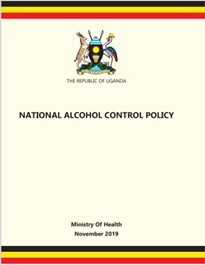UGANDA NATIONAL ALCOHOL CONTROL POLICY

The Government of Uganda (GOU) is making every possible effort to improve the health and socio-economic conditions of the people of Uganda in line with the policy of poverty eradication.
The government recognizes the role that alcohol plays in Uganda both in terms of its social and economic contribution and in terms of its significant capacity, when misused, to impose unacceptable costs on individuals and the community as a whole. While alcohol has existed for a long time, science has continued to discover its adverse health, social and economic consequences, some of which interfere with one’s personal, or professional life, family and the wider community, as well as national and regional development endeavors.
Apart from the heavy burden of infectious diseases, Uganda is also experiencing an upsurge in the occurrence of Non- Communicable Diseases (NCDs) such as hypertension, cancer, diabetes, mental illness and chronic heart diseases. The evidence in literature on the risk of developing non-communicable diseases as a result of alcohol use is irrefutable.
Alcohol can damage nearly every organ in the body and because it is psycho active, it can induce alterations in most of the brain structures and its use contributes to 200 diseases and conditions, including chronic diseases such as alcohol dependence, liver cirrhosis and acute health problems such as injuries. About 20% of the admissions at Butabika National Referral Hospital are due to alcohol or other drugs. Data from the WHO commissioned 2014 nation-wide non-communicable risk factor survey (STEPS) showed that 25.9% men and ii 14.3% women in Uganda were heavy alcohol users.
The 2014 Global Status Report on alcohol also indicated a per capita consumption of 9.8 litres compared to 6.0 litres in the African region and a prevalence of 5,8% Alcohol use disorders (AUDS) in the Uganda population. Alcohol consumption is associated with high risk behaviors including unsafe sex and use of other psycho active substances and tends to be associated with dependence on other drugs and sexually transmitted infections. Alcohol is used in many societies for social economic reasons.
However, if unregulated, alcohol causes unacceptable costs to the individual and community as a whole, which outweigh its perceived benefits. The Government of Uganda recognizes that for this policy to be effective and sustainable, cooperation and creative partnerships across all sectors including Health, Gender, Labor and Social Development, Justice, Law and Order, Local Governments, Education, Trade, Industry, and co-operatives, Finance and Civil Society Organizations among others are required. Responsibility for the successful implementation of this Policy should be shared by all Ugandans.
On 25th May 2005, the World Health Assembly adopted a resolution to adopt the Global Strategy to reduce harmful use of Alcohol which lists policy options and recommendations for addressing harmful use of alcohol. Uganda also adopted the recommendation of the high level meeting on NCDs held in New York on 19th June 2014 which recognized alcohol as a major risk factor for NCDs among other health problems and urged countries to reduce alcohol use to address NCDs. iii More recently, the United Nations Sustainable Development Goals (SDGs), in particular Goal 3 – Good Health and Well Being, has a target of strengthening the prevention and treatment of substance abuse, including narcotic drug abuse and harmful use of alcohol. Uganda has formulated a policy that will guide actions by all relevant stakeholders to reduce harmful use of alcohol.
Dr. Jane Ruth Aceng Ocero Hon. Minister of Health